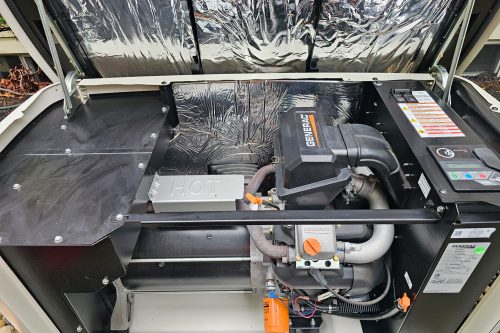Consistent generator maintenance is the most critical factor in ensuring power reliability when facing challenges like extreme weather, an aging grid, or the demands of remote work. Whether it’s a standby generator for a home, a critical backup for a hospital, or an industrial unit for a business, generators play a vital role in keeping the lights on and operations running.
But like any machine, a generator is only as good as the care it receives. Without proper maintenance, a generator can become unreliable, inefficient, or even suffer catastrophic failure at the exact moment it’s needed most. This blog explores some lesser-known but critical reasons for routine generator maintenance, including moisture buildup in the oil, insufficient exercise cycles, and hidden threats from pests such as ants and mice.
Moisture Buildup in the Oil: The Silent Saboteur
Moisture is one of the most common and insidious threats to any internal combustion engine, and generators are no exception. When a generator sits idle for long periods, condensation can form inside the crankcase. This water vapor mixes with the oil, creating a cloudy or milky mixture that compromises lubrication and accelerates engine wear.
Why It Matters
Water in the oil reduces its ability to lubricate engine components properly. Bearings, pistons, and other moving parts may begin to grind or seize, leading to expensive damage and reduced engine life. Additionally, moisture can promote rust inside the engine block and other metal components.
Preventive Measures
- Regular Oil Changes: Even if the generator hasn’t run many hours, oil should be changed at least annually to remove moisture and contaminants.
- Proper Exercise Cycles: Running the generator long enough to bring it to full operating temperature helps evaporate moisture inside the engine.
- Use of Engine Heaters: In colder climates, block heaters can reduce condensation and make starts easier.
Short Exercise Runs: A False Sense of Security
Most generators are programmed to run brief “exercise cycles” weekly or monthly to ensure they’re in working order. While this practice is vital, it can be counterproductive if not done correctly. A generator that only runs for 5–10 minutes may not reach optimal operating temperature, leading to incomplete combustion, carbon buildup, and—ironically—more moisture buildup.
The Danger of Too-Short Cycles
Engines need to run under load and at operating temperature to properly circulate oil, burn off contaminants, and keep the battery charged. Brief, no-load runs may leave unburned fuel in the combustion chamber and exhaust system, causing carbon fouling and reducing performance.
Best Practices
- Extended Run Tests: Periodically run the generator under load for 30–60 minutes to mimic real-world use and ensure systems are functioning as intended.
- Load Bank Testing: For standby generators that don’t see much use, professional load bank testing can verify performance and identify issues.
- Check Exercise Settings: Ensure that the automatic exercise schedule is sufficient and includes periodic extended runs.
Pests: Small Creatures, Big Damage
One of the most overlooked threats to a generator is pests. Insects and rodents are attracted to the warmth and shelter of generator enclosures. Unfortunately, they don’t just move in—they often chew, nest, and wreak havoc on wiring, insulation, and ventilation.
Mice and Rats
Rodents love to chew, and generator wiring is a prime target. A single frayed wire can cause control panel malfunctions, fuel delivery issues, or complete system failure. Nesting materials can clog vents or create fire hazards.
Ants and Insects
Fire ants, in particular, are notorious for invading electrical equipment. They’re drawn to magnetic fields and warmth, often building nests inside control panels. Their presence can short out circuits, damage boards, and cause unexplained electrical issues.
Preventive Strategies
- Physical Barriers: Use rodent-resistant mesh and seal all entry points to the enclosure.
- Pest Control Measures: Work with a pest control professional to treat the area around the generator with safe, non-corrosive deterrents.
- Routine Inspections: Open the enclosure and inspect wiring, ventilation, and control panels for signs of infestation or damage.
- Clean Surroundings: Keep the area around the generator clear of brush, standing water, and food sources that attract pests.
The Real Cost of Neglecting Generator Maintenance In NJ and PA
Ignoring generator maintenance can lead to serious consequences:
- Unexpected Downtime: Failure during a power outage can result in loss of data, spoiled food, business interruptions, or even medical emergencies.
- Expensive Repairs: Replacing corroded components, damaged wiring, or a seized engine can cost thousands of dollars—far more than routine upkeep.
- Shortened Lifespan: Like any engine, a generator has a service life that depends heavily on how it’s maintained. Neglect can cut that lifespan dramatically.
Establishing a Maintenance Routine
To keep your generator running reliably, a structured maintenance plan is essential. Here’s what a typical routine might include:
Quarterly or Biannually
- Visual inspection for leaks, damage, or debris
- Check oil and coolant levels
- Inspect battery voltage and terminals
- Run generator under load for at least 30 minutes
- Inspect and clean air filters
- Check fuel system for leaks or blockages
Annually
- Full oil and filter change
- Replace spark plugs (gas units) or inspect injectors (diesel units)
- Flush and replace coolant as needed
- Inspect control panels and wiring for signs of pest damage
- Perform load bank test (especially for mission-critical systems)
Partnering with a professional maintenance service ensures all these tasks are performed correctly and on schedule, and it provides documentation of maintenance history—something that’s often required for warranty claims or insurance purposes.
A generator is not a “set it and forget it” piece of equipment. It’s a complex machine that requires attention, testing, and care. By addressing issues like moisture buildup, ensuring adequate exercise runs, and protecting against pests, you can extend the life of your generator, avoid costly repairs, and—most importantly—ensure it’s ready when you need it most.
In an emergency, your generator might be your last line of defense. Don’t wait until the lights go out to find out it’s not up to the task.



